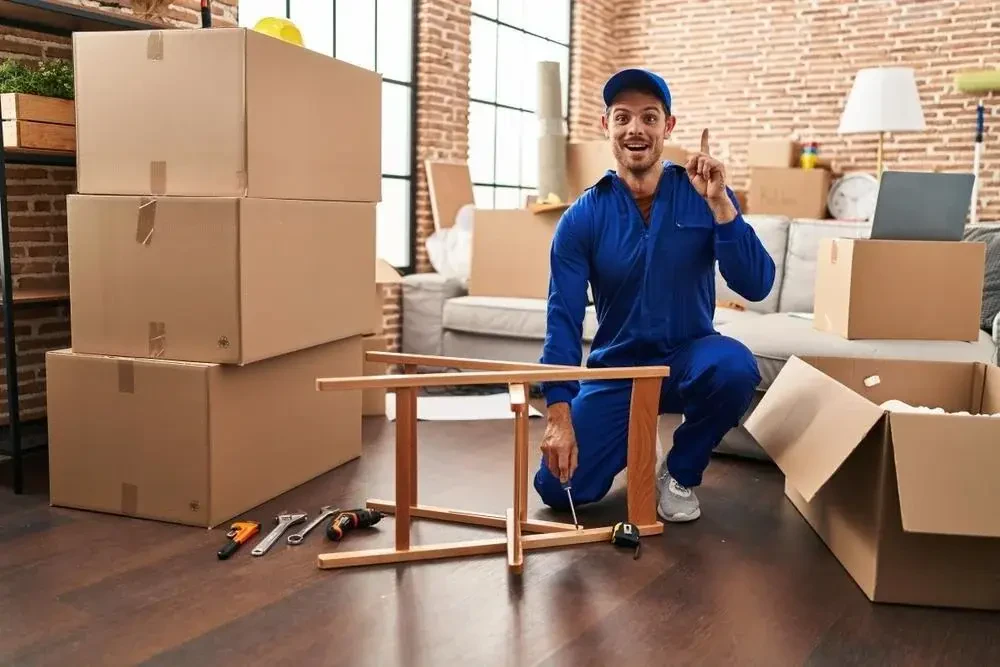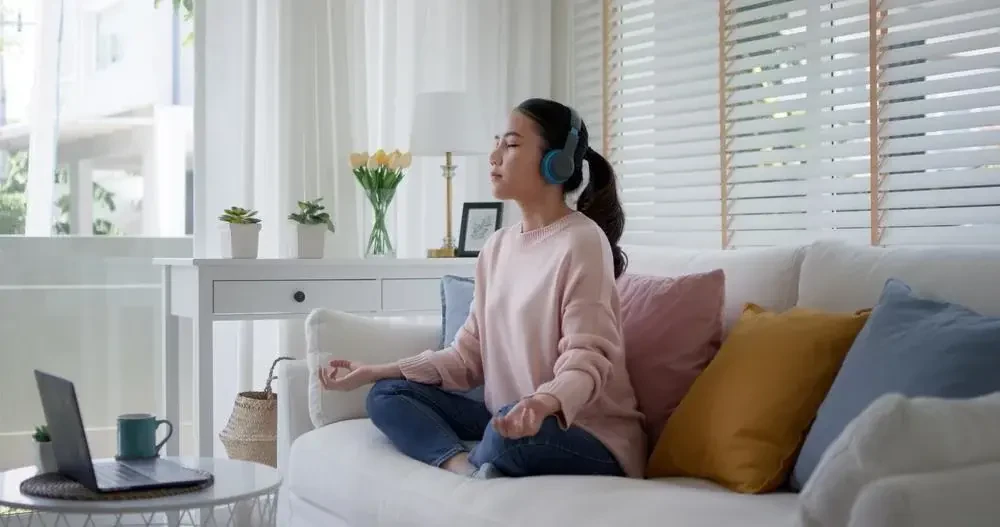Published by Chris Townsend
Last updated Jul, 06 2025

There are 5 ‘top’ stressful events in life that can leave us feeling jaded and low. It’s probably no surprise to learn that after the death of a loved one or a divorce, moving house is the next biggest life stressor.
It’s a situation that can be fraught and filled with pressure - no matter how well-prepared or organized you are. Even the best of us will have a wobble when it comes to packing up all our worldly belongings and moving to a new home.
It needn’t be that way though. Did you know that practicing mindfulness can be a great help when undertaking a huge life change such as this?
Yes, it’s a trendy buzzword that some folks might want to roll their eyes at, but don’t discount it. It’s a beneficial lifestyle choice that offers a huge potential when applied to major life stressors.
Interested to know more? Here are just a few ways in which planning a mindful house shift can improve your well-being.
Making a Mindful House Move Happen
You know what? It is OK to feel stressed when shifting house, and accepting this is one of the keys to dealing with bumps in the road. Letting the worry and anxiety get the better of you can make what is already a tricky situation a lot more difficult to cope with.
We’ve put together some handy hints and tips to encourage you to add mindfulness to your house move.

Use mindful breathing techniques
Moving day does mean an automatic increase in stress levels. You are going to feel pressure and that’s OK. One of the best ways to manage it is to perform some breathing exercises - and you can do these whilst you’re in the midst of it all.
This mindful exercise is particularly useful as it gets you to think of the moment and slow down. When we’re stressed, one of the first things to become ‘challenged’ is our breathing, which tends to become more shallow, so it makes sense to have an exercise like this up your sleeve.
- Close your eyes and take a deep breath for a count of four.
- Exhale slowly for a count of four.
- Hold your breath for a count of four.
- Slowly inhale again for a count of four.
Repeat this for about 60-90 seconds. It’s amazing what it can do to help calm you down and refocus.
Breathing exercises like this can help reduce your heart rate and lower your blood pressure which in turn helps you feel more able to cope.
On relcoating day, this will help you to carry out all the jobs you need to do calmly. There’s no limit on the number of times you can practice this exercise either, so take that time out and focus on your breathing.

Try some visualization methods
Visualization is a great way to bring some instant calm to the days leading up to moving (and the day itself). It involves, as you’d imagine, visualizing various scenarios - but in a positive, helpful way.
Here, you’ll be imagining yourself feeling calm, cool, and collected and that your shifting day is going slowly and without any problems. Think about the plans you’ve made and put in place for the day and think about them going well.
In the event of any changes and complications, you’ll be able to use this technique (in conjunction with the breathing exercise) to handle the situation better.
One of the nicest visualization techniques is to imagine yourself sitting in your new home, feeling content and happy. Think about all the lovely furniture you have and having all your prized belongings around you. This will make you feel calmer and more able to cope too.
Meditate
If you’re practicing visualization and breathing techniques, the next stage is to consider mediation.
Mindfulness meditative exercises can help with stress, low mood, and poor mental health states. It isn’t difficult and anyone can try it.
- Sit still somewhere comfortable
- Find something to focus your mind on. This can be your breathing, or it can be a particular sound in the distance or even the feeling of the floor.
- Focus and use it to drift away from your thoughts and feelings.
- Practice this for a few minutes.
Meditation can help you take a few moments to center yourself. If you’re feeling calmer and more focussed you’re much likelier to be able to tackle whatever the day throws at you, in a better state of mind.

Mindful sleep habits
It’s obvious to state, but not always so easy to achieve - for good mental health you need to get a decent amount of sleep. When going through a life change like this, it becomes even more important.
If you can’t sleep or find it difficult, at least try to rest and relax when you can. To help improve the quality of rest/slumber you get, try the following mindful behaviors.
- Keep phones, smartphones and computer devices away from the bedroom.
- The same rule applies to TVs and stereos.
- Go to bed half an hour or so before you intend to, if you know you’ll have trouble relaxing.
- Write a list of all your worries before bed, but don’t take this into the bedroom with you.
These little tips can help you feel freer to rest and relax. Getting to your moving day feeling rested as you can, will make a big impact on how the day goes and how you feel.
Mindful fresh air
Your home, when preparing to move, can feel untidy and slightly suffocating - after all, everything you own will be packed up in boxes or out of reach. This can have an impact on you - giving rise to feelings of claustrophobia and tension.
Taking regular breaks and heading out for fresh air will help your mental state in the run-up to a move. Just five or ten minutes every day can make a huge difference and once you’ve relocate, practicing the same technique can help with the other big job - unpacking!

Try not to catastrophize
When you’re anxious and in a whirlwind of thoughts, it can be easy for them to turn into something unpleasant and negative.
You’ve so much going on that it can result in catastrophization and imagining everything in ‘worst-case scenario’ terms.
‘What if-ing’ solves very little and while it might be difficult to stop the train of thought, you can change how you respond to it. For instance, ‘What if this happens?’ or ‘What if that goes wrong?’ are common troublesome thoughts.
A useful way of dealing with these is to counter them with ‘how likely is that to happen?’. You’ll soon see when you’re jumping to the worst-case scenario and learn to think in more positive ways.
Mindfully slow yourself down
When your thoughts race, it’s often because you’re thinking too much about the bigger picture. You’re moving house, so that means it all ‘has to be done in one day’, but it doesn’t - you can focus on unpacking and settling in.
However, if you reframe your thoughts to think about the small parts of each task, it helps you achieve more than if you simply think about the end goal.
Unpack the most important things first - your kettle, your bed, etc and then ensure you take plenty of regular breaks from it all to settle in properly and get used to your new surroundings.

Musically mindful
Music can be so healing in stressful times and we all have favorite songs or bands that help us feel more alive and improve our mood.
Choose music you know you love and that has a special connection for you - and listen to it as you pack and move, it’ll help set a positive mood and encourage you to feel happier and more relaxed.
There’s no rule about the sort of music you should listen to - it’s very personal. However, some people might actively choose more relaxing listening such as classical music, or even nature sounds to help stay focussed and calm. It honestly doesn’t matter - you choose whatever works for you to help release the stress valve.
Sustain yourself in a mindful way
Good food and plenty of water are key to a mindful move. Though you may feel stressed and less like eating, making sure you have three square meals a day, snacks, and enough hydration will not only ensure you’ve got the right energy levels to sustain the move but also make you less likely to feel ‘hangry’ or have issues with fluctuating blood sugar because of missed meals or snacking on the wrong types of food.
If you’re someone who struggles with eating when feeling stressed - having protein shakes or nutritional drinks to hand can help (even a glass of milk is better than nothing).
On the day you move make sure you have a sustaining breakfast and put together packed lunches to make sure there is instant homemade food to hand to keep you sustained. Have a water bottle with you and keep this topped up to drink from as you go.
It can be a good idea to have a makeshift kitchen set up - with brewing up accouterments, biscuits, crisps, and other little treats. It should be the last thing you pack before you leave your old home for your new one, and the first thing you unpack when you arrive at your new destination.

Chat and unwind
It’s important to have someone to talk to - and if it feels better, someone impartial. Bottling up your feelings isn’t good and moving house can cause all sorts of emotions to come bullbing to the surface.
Chat with friends and family if you feel you can, but if you do feel in crisis or as though you can’t cope - having some therapy or counseling can really benefit and get you to unpack your emotions (alongside the cardboard boxes).
If you’re relocating with someone, try and lean on each other for support - you’ll both have different worries and concerns that the other one can listen to and understand. Having a support network away from the move, comprising people who aren’t involved in it can also benefit. Chat with them, swap jokes, discuss anything but moving, and keep the conversation light - it can be a welcome distraction.
Shifting alone? If you have friends and family on hand then rely on them as a support network, even if they can help with the physical shift. They can still be there for you to chat with!
Some final thoughts on mindful house moves
Whilst relocating house is one of the most stressful things you can do, it doesn’t have to be this way if you choose to practice some mindful techniques to help you through the process. It won’t be without its challenges, but it will feel an awful lot easier to deal with. Once you have completed your move, you may find it easier to settle in and adjust too!



